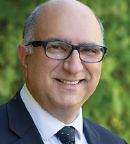
Joseph C. Alvarnas, MD
“When people don’t respond [to chimeric antigen receptor (CAR) T-cell therapy] as well as they should, it may be that the T cells are depleted and functionally exhausted. The mechanism of exhaustion is in part mediated by checkpoint-related killing. By thwarting that process with pembrolizumab (Keytruda) or nivolumab (Opdivo), this small study suggests that we can improve the quality and duration of response in patients we would expect not to do as well,” stated Joseph C. Alvarnas, MD, Vice-President for Government Affairs at City of Hope, Duarte, California. Dr. Alvarnas moderated a press conference where the study by Li et al was discussed.
Mark D. Leick, MD, a fellow in the Maus Laboratory at Massachusetts General Hospital, Boston, said that CAR T-cell researchers are excited about the approach of using checkpoint inhibition to augment a waning CAR T-cell response. “All of us are excited about this approach, which is promising. This is a natural next step. Real-world experience at multiple institutions shows high levels of exhaustion markers after CAR T-cell therapy stops working. Use of a checkpoint inhibitor recaptures CAR T-cell expansion after loss of proliferation,” he said.
“We need prospective trials that are rationally designed to study this. Other approaches are also being used, such as CRISPR (clustered regularly interspersed short palindromic repeats), which can edit the DNA and knock out checkpoint receptors themselves to overcome T-cell exhaustion,” he continued. ■
DISCLOSURE: Drs. Alvarnas and Leick reported no conflicts of interest.

